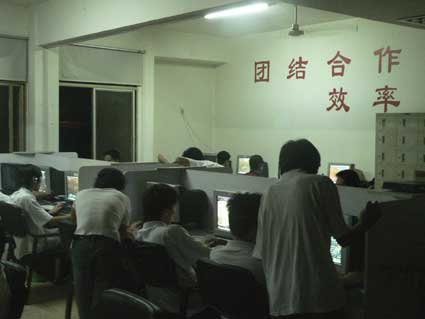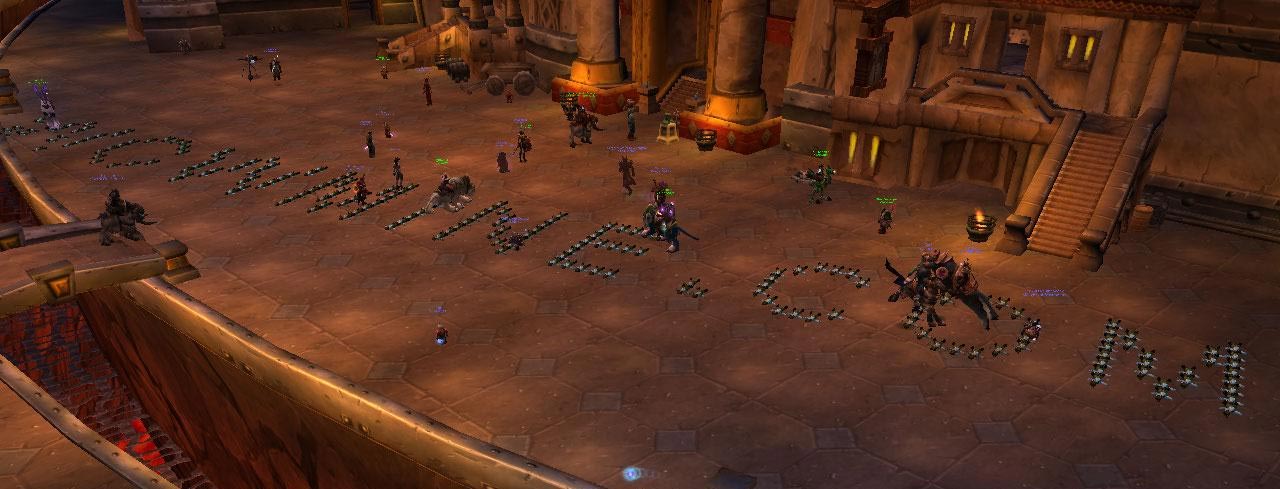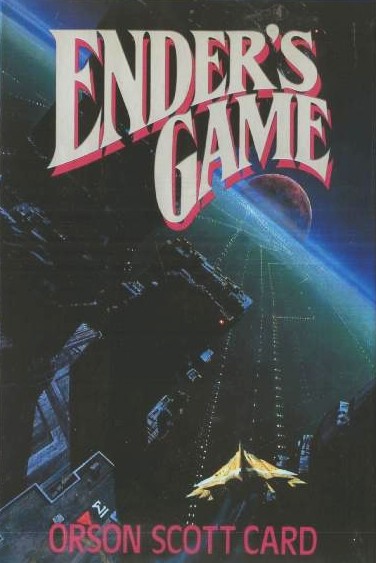Notes Towards Day 23: Gold Farming


Laura’s live-blogging the session
I. Coursekeeping
By Sunday evening,
post (as usual) your
thoughts-for-the-week-past (or future) AND
your vote on our multimedia presentation choices
(16–out of 17–votes so far for a group discussion
of “selected” presentations;
do you want Laura and me to do the selecting?
doesn’t that–inappropriately–give us the final say?)
By Sunday evening,
For Monday’s class, also read the fourth chapter (“The Cyborg Solution”) from the 2004 volume, Technofeminism, by Judy Wajcman (an Australian sociology prof @ London School of Economics).
II. Last Monday, Laura managed a conversation among us about the differences between virtual worlds and on-line gaming,
specifically on the gendering that occurs in both sorts of spaces;
more generally about what draws us to them or not
Williams, Consalvo, Caplan & Yee:
“the general trend in Internet research is to find online activities
more of an extension of offline life, e.g. a maintenance tool, than a substitute for it”)
DC, Chill Out, It’s Just a Fantasy:
I personally hold the body and actual life experiences as more sacred than whatever goes on inside a game. To me, body is more important than fantasy.
Baibh: When we discuss the “virtual” qualities of a world, it undermines the validity of the world….I prefer games that have little relation to the life offline, if I’m playing a game I expect it to be a game, not another versino of visual monopoly…Gaming is not meant to take over the functions of your actual life.
Aline: does this mean that non-gamers are more grounded in reality, or have less technological computer knowledge? I am trying to understand what draws some people to games like second life and others to simpler videogames or no video/computer games at all. To what extent is identity a factor?
Our experiences spanned a range of (non-aligned) spectra, which affected both how comfortable we felt in these various arenas, and how distinct they felt from our experiences off-line:
Freedom ———————————————————————— Constraint
Experienced ————————————————————— Inexperienced
Doesn’t Resemble Self ——————————————- Resembles Self
Fantasy —————————————————————————- Reality
Lack of Rules ——————————————–Unfamiliar Rules, Controls
Knowing the Objectives —————————Not Knowing the Objectives
Knowledge ———————————————————- Lack of Knowledge
We also discussed the article about “Gender roles and behaviors among online gamers”–which I had a lot of trouble with.
It begins with presumptive–and stereotypical–gender differences (men vs. women; aggression vs. sociality), presumes a significant variation, and then uncovers findings “consistent w/ expectations.” There is a real problem w/ this methodology, which constructs a distinction before gathering the data. I was drawn to all the “cracks” in that story:
-
“women who do not categorize themselves in gender-stereotypic ways”
-
those who “declined to provide gender”
-
those who “declined to answer the sexual identification question”
-
the “hard core” female playing pattern, as well as the bixexual subgroup
-
“psychological gender” (“which allows for more nuanced measurements of masculinity and femininity, including potential androgyny”), etc. etc.
I didn’t see much “residue” from the first section of our course, on the “technologies of gender”; it was treated throughout this essay as entirely normalized and naturalized. I wanted some sense of the constructedness of gender identities and roles.
Natasha: whether these kinds of games appeal more to women or men or other people (this “other” group is one we haven’t been exploring too much in the context of gaming and their perception of it)
I also had lots of questions re: the differences between correlations and causations (what’s the directionality here, between life and playlife, between cause and effect?).
II. So: feeling grumbly about social science methodologies, I was looking forward to returning, today, to a discipline that works “better” for me in exploring and explaining the world (because withholding over-generalization): that of individual storytelling.
Laura had selected two personal stories from 2006 anthology, She’s Such a Geek: Women Write About Science, Technology, and Other Nerdy Stuff, both about girls getting good @ gaming–>”developing their own unique blend of geekosity,” becoming “the princesses of our own domains”…
…which immediately reminded me of the (counter!) limits of not generalizing, of telling your own story w/out much reflection on its larger implications.
Which brings us to our third reading,
“Anda’s Game,” by Cory Doctorow. Bingo!
This seemed to me really worth our (shared) time: both individualized and more largely reflective: a (sometimes) compelling story that questioned its own terms of engagement.
The title is a play on the famous SF novel Ender’s Game
(is the story a re- or de-construction of the original?).
“Anda’s Game” is–very importantly– the first story Salon published under a Creative Commons license; and
more importantly? (Doctorow’s summary) “it riffs on the way that property-rights are coming to games: the bizarre spectacle of sweat-shops in which children are paid to play the game all day in order to generate eBay-able game-wealth.”
After four classes of agonizing about our identities–do we re-do them or re-solidify them on-line? how do we develop our player’s character? how do we progress, and get better @ what we do?–this was a real relief! A break from looking @ our navels…
-
a reminder of what Nat’s been saying all along re: the U.S.-centricity of our work together here;
-
a return to Guinevere and Maddie’s reiterated questions re: how to apply what we are doing here outside here
or: what difference does it make?
how to enact that difference?
What character would we play [do we play??] in this society and why?
“Gold Farming” is a whole new ball game for me; so more for you:
Ben Hoyle, Gamers’ lust for virtual power satisfied by sweatshop workers, The Times, September 23, 2006
Julian Dibbel, The Life of the Chinese Gold Farmer, New York Times Magazine, June 17, 2007
Rowenna Davis, Welcome to the New Gold Mines, The Guardian, March 5, 2009
Ge Kin, ‘Chinese Gold Farmers in MMoRPGs”
15:30-17:40
“One person’s play is another person’s work”
Marx on “the alienation of play”=power-leveling
“We sell our labor to someone else; it does not belong to us….
inevitable in capitalism? Play is an irreducible element of life…
what happens when it is commodified”?
21:08-25:07
“More than outsourcing”:
“in the virtual world, the competitors for resources and the consumers have to face the Chinese gold farmers, and that kind of encounter causes anxiety”
“in the virtual world, our identity shouldn’t be limited to nationality or race, but those things still matter”
“the virtual world is the perfect global village, this small place where players from all over the globe can play together”
“but it is also a divided world:
those things that divide us in the real world still divide us–
it has become a manifestation of the necessity to define yourself against some one else, to have this win or lose scenario”
“gold farming pollutes the magic circle, this pure fantasy world
totally isolated from any troubles in the real world”
“As a non-gamer, I don’t care if I am playing this fair game;
it’s never a level playing field for me”
“What does this phenomenon tell us about the real world?
What lesson can I learn?”
“The world is not flat=
everyone does not have the same access to the same global market; the gold farming shows that it is a divided global village.”
So: two things for us to do, apart, then together:
-
think generally about/explore specifically what difference personal storytelling makes, as a discipline/way into these questions. Begin to re-write the story you put on-line, about “my gaming experience,” “my game report,” “thinking about my relationship with online worlds”–>
-
think about your pronoun use (he? she? ze?), your activity (on-line, in-meat space?); the quality of your relationships (agressive, caring?); your development (as a character, an avatar, a person); the outcomes….
-
but also think especially about/explore the challenge raised by Doctorow’s story: what are the implications of your own gaming experiences for others in the world? In other words, try to think beyond your own “identity issues” to ask (and try to answer?) the problem posed in Doctorow’s story: “The kids in the game–-she didn’t know what to do about them.”
-
How might you re-write your own narrative, about your gaming experiences this past weekend, from a more global–or linked– perspective? Think not only about the “identities” of the gold farmers (or those who have assembled your computer, or maintain it, or…) but about the conditions in which those identities are being constructed.
-
Tech Recruiting Clashes With Immigration Rules
On who else’s labor does your gaming depend? What do they need you to do? What can you do? What will you do?
Write for 5-10, chat in 2’s or 3’s for 5-10 minutes…
and then we’ll talk?
(avoiding any attempts to over-structure the
conversation, a la last week’s debacle? -


Laura’s live-blogging the session



Trackbacks and Pingbacks
Comments are closed.